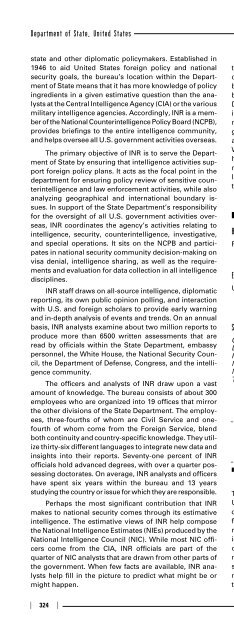ENCYCLOPEDIA OF Espionage, Intelligence, and Security Volume ...
ENCYCLOPEDIA OF Espionage, Intelligence, and Security Volume ...
ENCYCLOPEDIA OF Espionage, Intelligence, and Security Volume ...
Create successful ePaper yourself
Turn your PDF publications into a flip-book with our unique Google optimized e-Paper software.
Department of State, United Statesstate <strong>and</strong> other diplomatic policymakers. Established in1946 to aid United States foreign policy <strong>and</strong> nationalsecurity goals, the bureau’s location within the Departmentof State means that it has more knowledge of policyingredients in a given estimative question than the analystsat the Central <strong>Intelligence</strong> Agency (CIA) or the variousmilitary intelligence agencies. Accordingly, INR is a memberof the National Counterintelligence Policy Board (NCPB),provides briefings to the entire intelligence community,<strong>and</strong> helps oversee all U.S. government activities overseas.The primary objective of INR is to serve the Departmentof State by ensuring that intelligence activities supportforeign policy plans. It acts as the focal point in thedepartment for ensuring policy review of sensitive counterintelligence<strong>and</strong> law enforcement activities, while alsoanalyzing geographical <strong>and</strong> international boundary issues.In support of the State Department’s responsibilityfor the oversight of all U.S. government activities overseas,INR coordinates the agency’s activities relating tointelligence, security, counterintelligence, investigative,<strong>and</strong> special operations. It sits on the NCPB <strong>and</strong> participatesin national security community decision-making onvisa denial, intelligence sharing, as well as the requirements<strong>and</strong> evaluation for data collection in all intelligencedisciplines.INR staff draws on all-source intelligence, diplomaticreporting, its own public opinion polling, <strong>and</strong> interactionwith U.S. <strong>and</strong> foreign scholars to provide early warning<strong>and</strong> in-depth analysis of events <strong>and</strong> trends. On an annualbasis, INR analysts examine about two million reports toproduce more than 6500 written assessments that areread by officials within the State Department, embassypersonnel, the White House, the National <strong>Security</strong> Council,the Department of Defense, Congress, <strong>and</strong> the intelligencecommunity.The officers <strong>and</strong> analysts of INR draw upon a vastamount of knowledge. The bureau consists of about 300employees who are organized into 19 offices that mirrorthe other divisions of the State Department. The employees,three-fourths of whom are Civil Service <strong>and</strong> onefourthof whom come from the Foreign Service, blendboth continuity <strong>and</strong> country-specific knowledge. They utilizethirty-six different languages to integrate new data <strong>and</strong>insights into their reports. Seventy-one percent of INRofficials hold advanced degrees, with over a quarter possessingdoctorates. On average, INR analysts <strong>and</strong> officershave spent six years within the bureau <strong>and</strong> 13 yearsstudying the country or issue for which they are responsible.Perhaps the most significant contribution that INRmakes to national security comes through its estimativeintelligence. The estimative views of INR help composethe National <strong>Intelligence</strong> Estimates (NIEs) produced by theNational <strong>Intelligence</strong> Council (NIC). While most NIC officerscome from the CIA, INR officials are part of thequarter of NIC analysts that are drawn from other parts ofthe government. When few facts are available, INR analystshelp fill in the picture to predict what might be ormight happen.The major security lapses of the recent past such asthe failure to predict the true strength of Soviet militarydefenses <strong>and</strong> the surprise testing by India of a nuclearbomb have led to calls to improve U.S. intelligence capabilities.Reinvigorating the diminished place of the StateDepartment, particularly INR, in collecting <strong>and</strong> evaluatingintelligence has been proposed as one means of betteringnational security. Policymakers need estimative intelligenceto help them underst<strong>and</strong> the more diffuse <strong>and</strong>ambiguous threats <strong>and</strong> opportunities of the post-ColdWar world <strong>and</strong> the specific knowledge offered by INR hashistorically served as a valuable national security component.Accurate <strong>and</strong> timely intelligence is the critical firstline of defense against danger <strong>and</strong> INR provides exactlythis material.❚ FURTHER READING:BOOKS:Ford, Harold P. Estimative <strong>Intelligence</strong>: The Purposes <strong>and</strong>Problems of National <strong>Intelligence</strong> Estimating. Lanham,MD: University Press of America, 1993.ELECTRONIC:United States <strong>Intelligence</strong> Community. “Department ofState: Bureau of <strong>Intelligence</strong> <strong>and</strong> Research. (March 23,2002).SEE ALSOCIA (United States Central <strong>Intelligence</strong> Agency)Department of State, United States<strong>Intelligence</strong> CommunityNational <strong>Intelligence</strong> EstimateNIC (National <strong>Intelligence</strong> Council)Terrorist Organization List, United States❚ JUDSON KNIGHTDepartment of State,United StatesThe Department of State is a cabinet-level division of theUnited States government concerned with the planning,conduct, <strong>and</strong> management of U.S. foreign policy <strong>and</strong>foreign relations. The secretary of state is the highestrankingmember of the cabinet, <strong>and</strong> traditionally, secretariesof state have been among the most powerful membersof the government. The State Department includes sixmajor sections, each headed by an under secretary ofstate, concerned with Political Affairs; Economic, Business,<strong>and</strong> Agricultural Affairs; Arms Control <strong>and</strong> International<strong>Security</strong>; Global Affairs; Management; <strong>and</strong> Public324 Encyclopedia of <strong>Espionage</strong>, <strong>Intelligence</strong>, <strong>and</strong> <strong>Security</strong>







![The Big Lie 9-11 and Government Complicity in Mass Murder [PDF]](https://img.yumpu.com/50957077/1/190x245/the-big-lie-9-11-and-government-complicity-in-mass-murder-pdf.jpg?quality=85)








